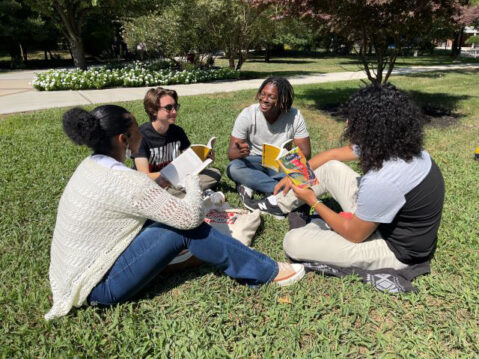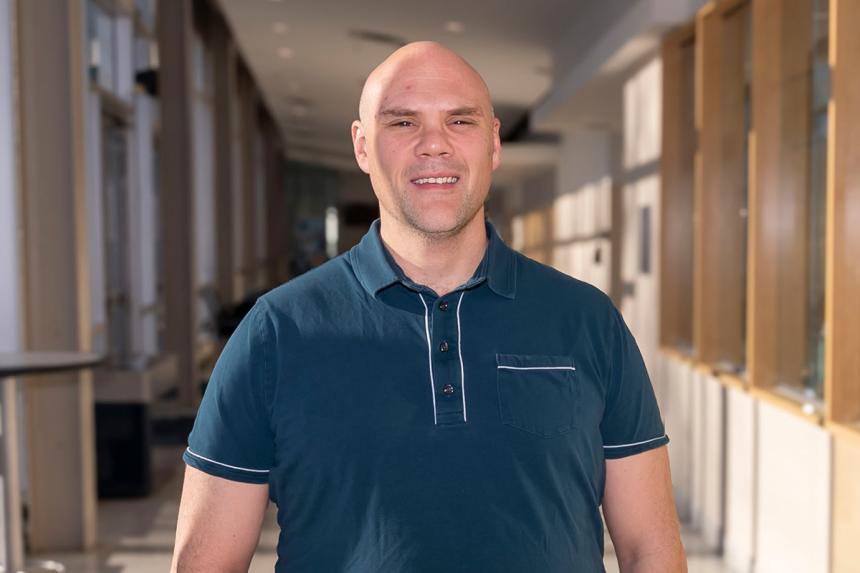
Learn About Rain Gardens at LB Senior Center Tonight
September 18, 2024
Local Obituaries
September 18, 2024
Students across Kean University are taking part in the Common Read, exploring themes of environmental justice, sustainability and community by reading and discussing the novel How Beautiful We Were. (Photo Credit: Kean University)
UNION. — More than 2,000 Kean University students will explore themes of environmental justice, sustainability and community in a fictitious African village this fall as part of the University’s fourth annual Common Read.
Kean freshmen and others will study the novel How Beautiful We Were, by The New York Times bestselling author Imbolo Mbue, as the University begins the semester with the shared reading experience.
 Inspired by the author’s childhood growing up in a town near an oil refinery in Cameroon, the novel tells the story of the fictional villagers’ fight against an American oil company. Mbue will give a reading at Kean on Tuesday, November 19.
Inspired by the author’s childhood growing up in a town near an oil refinery in Cameroon, the novel tells the story of the fictional villagers’ fight against an American oil company. Mbue will give a reading at Kean on Tuesday, November 19.
“The Common Read builds community for Kean students through reading and sharing viewpoints about important topics,” said Kean President Lamont O. Repollet, Ed.D. “This novel is the perfect fit for Kean because of the University’s work related to environmental justice and its role as the state’s urban research university.”
Copies of the book are provided free to all Kean freshmen.
The Common Read is sponsored by the Provost’s Office with support from General Education and the Office of Diversity, Equity, and Inclusion (DEI).
The book selection for the Common Read is made each year through a campus-wide nomination process.
“Each year the selection committee of students, staff, and faculty review titles suggested from across the Kean community and then collectively decide on a book that will give our students a powerful introduction to engaging with a text at the college level,” said Acting Associate Provost for Special Projects Jonathan Mercantini, Ph.D. “The Common Read offers a valuable opportunity for our students to share discussion and a collective experience.”
Kean Common Read Coordinator Abriana Jetté, Ph.D., a lecturer in writing studies, said the project has become “a unifying thread” that weaves together the diverse campus community.
“Each year, I’m moved by conversations that transcend classrooms and create connections among students, faculty and staff who might never have crossed paths otherwise,” Jetté said. “As our campus continues to engage with How Beautiful We Were, we’ll see the interconnectedness of the humanities and the sciences.”
In addition to the author visit November 19, at 3:30 p.m. in Wilkins Theatre, other book-related activities are planned. A panel discussion, History of Protests, will be held Tuesday, October 15 during University Common Hour, 3:15-4:15, featuring faculty from English, sociology and political science, and students, sharing experiences from the 1960s to today.
The Common Read Awards, given in May, offer a monetary essay prize to students writing about How Beautiful We Were. All Kean students are eligible.
Erin Lester, assistant director of the Office of DEI, said the book increases awareness of a societal issue and empowers students to advocate for important causes.
She said the Common Read has “without a doubt” helped build a more connected Kean community.
“We are so proud to support this anchor initiative, especially with a history of such powerful selections The Poet X (2021), All Boys Aren’t Blue (2022) and The Future is Disabled (2023), which encourage students to see the world through the lens of diverse authors. This initiative continues to be a cornerstone in our efforts to promote equity, inclusivity and social justice at Kean University,” she said.
Kean junior Ugochi Adibemma, of Union, is a public health major and the multicultural affairs manager in the University’s Office of DEI. Her family is from Nigeria.
She participated in the selection process for the Common Read.
“Imbolo Mbue does an incredible job of highlighting the overlap of environmental justice and public health, which I find very relevant to my major. This book really makes you think about how corporate exploitation can devastate a community, especially in terms of health and well-being,” she said.
Adibemma said she looks forward to discussing the book with students from other majors.
“There is a lot to gain by just being open to learning about different cultures,” she said.
ABOUT KEAN UNIVERSITY
Kean University, New Jersey’s urban research university, is a national institution of higher education recognized for its diversity, innovation and the social mobility of its graduates. Founded in 1855 as a teachers college, Kean has evolved into a thriving research university that supports students as they persist to graduation, give back to their communities and launch successful careers. Kean’s six colleges offer more than 50 undergraduate programs, six doctoral degree programs and more than 70 options leading to master’s degrees, professional diplomas or certifications, across a full range of academic subjects. With campuses in Union, Toms River and Manahawkin, New Jersey, and Wenzhou, China, as well as Kean Online, the University provides students of all backgrounds an affordable and accessible world-class education. Learn more at www.kean.edu.




